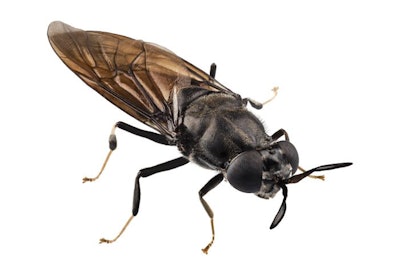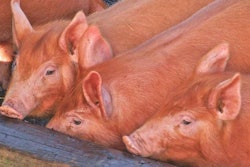
With the intent to reduce feed costs for tilapia production and Ghana’s reliance on imported protein feed ingredients, French-based biotechnology company, Cycle Farms, has launched its first facility for the production of insect meal in the West African country.
Ghana’s aquaculture sector has received a boost to future growth, according to the Minister of Fisheries and Aquaculture, by reducing the cost of fish feeds, without increasing competition between food and animal feed production.
Hon. Elizabeth Afoley Quaye was speaking at the inauguration of a new facility in the city of Tema, reports Ghana Web, where insect proteins will be produced for aquaculture feeds by French-based biotech firm, Cycle Farms. Currently, Ghana exports most of its fish meal to Asia, leaving its own aquaculture and poultry farmers reliant on imported soybean meal, according to the report.
From its new 2,500-square-meter site in Ghana, the Cycle Farms’ new facility has an initial annual capacity of 3,500 metric tons (mt) of insect products for the aquaculture market. Production will be scaled up as the market grows, according to CEO, Marc-Antoine Luraschi.
He said that the black soldier fly was chosen for culture because of its suitability for tilapia production, which can make a good contribution to the growing protein needs of Ghana’s human population.
The fly larvae will be grown on local fruit and vegetable wastes — which is a “huge problem for the government and society to manage,” according to local partner, Wisdom Abodakpi — and then combined with other ingredients to make feeds ranging from 33 to 56 percent protein to suit the requirements of different ages of fish.
First priority will be on feed for tilapia fingerlings, said the firm’s chief technical officer Floran Laville, as these tend to be imported, and this early stage is crucial for the growth and health of the fish. Later, the firm will look to expand with feeds for catfish and shrimp.
Ghana’s aquaculture production amounted to 52,480mt in 2016, with an estimated value of US$53.5 million, according to the United Nations’ Food and Agriculture Organization (FAO). Of this total, 50,900mt was Nile tilapia.
According to the firm’s website, Cycle Farms SAS was set up by three engineers in the Pays de Loire region of France in 2015. Its business model is based on an R&D center on France and a production facility in Ghana “to answer growing requirements from fish and poultry farmers,” and targeting feed markets in emerging countries.
Earlier this year, a report was published that showed diets containing black soldier fly larvae produced meat more efficiently and cheaply than fish meal, and at a price similar to soybean meal. The research was carried out by the Animal Research Institute of Ghana.
The potential for insects to help feed a growing global human population sustainably was recognized by the FAO as long ago as 2003.
A guide to the safe production of insects for human food and livestock feed was published earlier this year.
As a recent market report from Meticulous Research estimated the value of insect protein worldwide to reach US$8 billion by 2023, another insect protein company, Ÿnsect, announced it would begin upscaling its facilities in France for the production of mealworms of the Molitor beetle for aquaculture feeds.

















